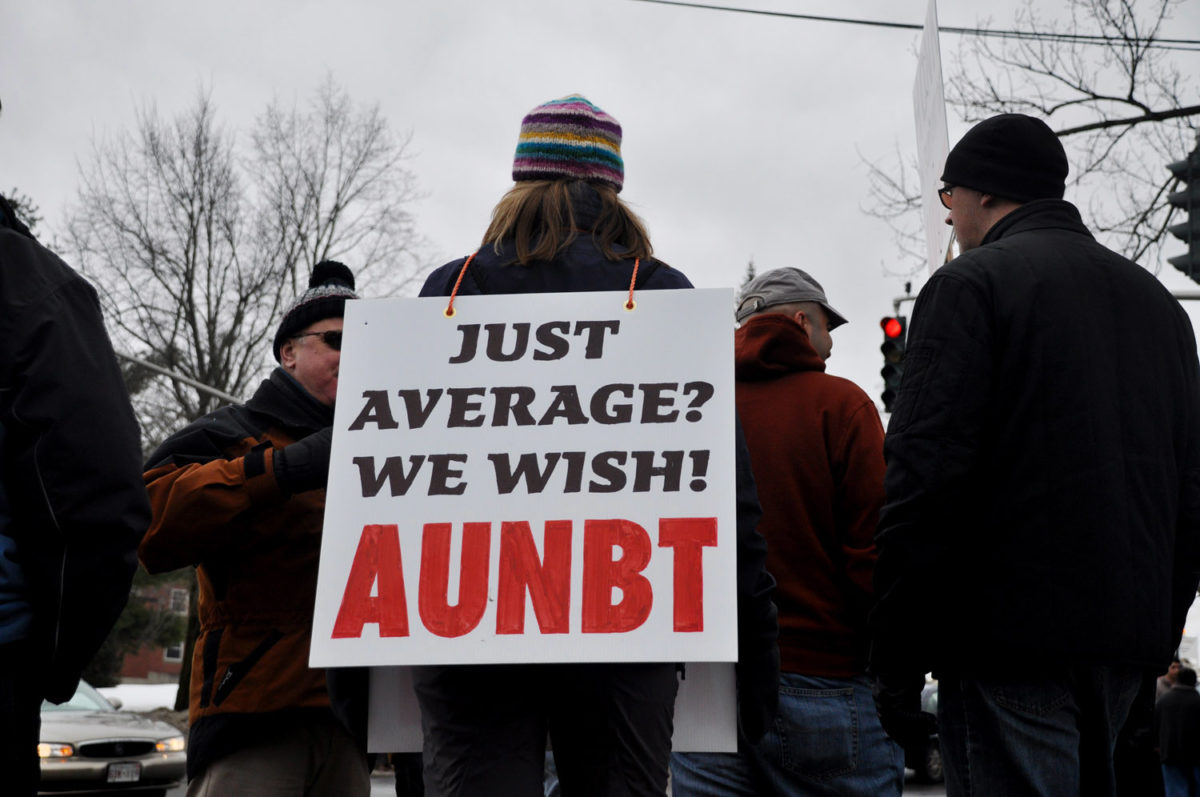
About 150 UNB students and community members rallied together early Friday morning. They dropped off plastic folding tables in front of the faculty’s strike headquarters and the Old Arts Building, which houses the president’s office, to send the message that both sides need to “get back to the table.”
The table they speak of is the negotiation table, and the biggest faction of the UNB population doesn’t have a seat.
Students like Katie Doucet, a third-year science student, are tired of waiting.
“I’m not for either side. I just want them to talk. That’s all I’m asking: for them to just talk and push forward somehow,” said Doucet.
Neither the faculty association, the AUNBT, nor the administration has substantially changed their offers in three weeks. The AUNBT announced that they are seeking a pay increase of 23.5 per cent over four years. The university is offering 9.5 per cent over the same time.
Doucet, 26, is a mature student. This is her second stint at UNB, and she doesn’t want to leave for another school.
She started at UNB in 2007. She was fresh out of high school and suffered from high anxiety and depression. She was put over the edge after her 17-year-old cousin committed suicide in December. She withdrew from classes before exam week. She tried again once classes restarted in January, but withdrew permanently after two weeks.
Three years later the Fredericton native felt fit to try again, and succeeded.
“UNB was so supportive and helpful. The admin got me in contact with people who could help me make the transition back into school. Just them giving me a second chance meant so much. That is why this strike hurts me so much on a personal level,” she said.
Like many other students, she helps pay the bills by working for the school. Last semester she tutored students, and this semester she was prepared to pick up a second job as a teacher’s assistant in physiology.
UNB president Eddy Campbell announced if the strike continues for four weeks, it could put the winter term in jeopardy for students. The university is now entering the third week of the strike, and for student-employees, the third week of unemployment.
“I really need them to come to terms so that I can pay my rent, go to school and get back to my life,” said Doucet.
While Doucet will likely be able to find a job if the semester is lost, international students will be faced with more complications.
Quang Vũ Mai is the international student advocacy coordinator with the UNB Student Union. He is also president of his residence, Tibbits Hall.
Hailing from Vietnam, the third year chemical engineering major hopes he won’t have to move to a new place if the semester is lost.
“Transferring to another school is one of the last options I want to think of… Seeing myself moving to a brand new environment in my last years of school is scary and challenging. But if the strike keeps going for a long time, I will sure try to continue my studies at a different university.”
Mai says he and his family pay about $25,000 per year for him to live in Fredericton and attend school. Now he is stuck paying much of that anyway, despite not receiving the education he came for.
“In case of a semester lost, I will definitely have to leave because I would barely be able to cover my cost of living,” he said, adding that many foreign students will also have to worry about their visas and work permits. “It’s the uncertainties that concern you the most, being by yourself in a strange country, not sure what is going on is pretty scary.”
This is not to say that the typical New Brunswick student isn’t struggling.
Niko Row, a third-year philosophy major from Bathurst, said with the possible extension of the semester into the spring, he’s afraid he won’t be able to take the intersession courses he needs to graduation on time.
For New Brunswick students, graduating on time means receiving a timely completion rebate off your loan, which can total upwards of $20,000.
Like many students, Row doesn’t support UNB professors or the administration. He just wants to get back to class.
“Right now it seems like ‘my way or the highway,’ and at the same time both sides say they have the students in mind. If they really had the students in mind, they would try to get back to work right away. As it stands, the teachers have really been picketing for no reason, because neither side has gone back to the bargaining table.”
